|
|
|
Sort Order |
|
|
|
Items / Page
|
|
|
|
|
|
|
| Srl | Item |
| 1 |
ID:
111253
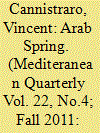

|
|
|
|
|
| Publication |
2011.
|
| Summary/Abstract |
The Arab Spring has affected interests of the Western democracies in the Middle and Near Eastern nations, and the instability will compel changes in American policies for the region. There have been political revisions and in some cases nontraditional modifications in moribund autocracies and dictatorships across the Arab world, reaching to the Arab and Persian Gulfs. The awakening has been enervated by violent responses from more cohesive and profound dictatorships in Syria and Libya, but the "leaderless" model of the awakening can quickly bring together disparate groups working toward a common goal. As the process across the Arab world unfolds, American interests will need to be addressed in ways different from the past. New American wars will not be a promising option. The region's challenges require a serious and consistent policy toward resolving the core issues of instability, and that includes overcoming domestic opinion and lobbies that work against a two-state solution for Israel and Palestine. The current demographic prospect is that Israel will lose its Zionist hopes by the forced integration of Palestinians who have lost their own hope of a viable and independent nation.
|
|
|
|
|
|
|
|
|
|
|
|
|
|
|
|
| 2 |
ID:
138301


|
|
|
|
|
| Summary/Abstract |
What determines the location of those human rights international non-governmental organization (INGO) resources found outside of the highly developed Western democracies? We draw a distinction between the bottom-up mobilization processes driving the location of human rights organization (HRO) members from the top-down strategic concerns driving where HRO leaders place permanent offices. In particular, we find that, while political opportunity structures generally increase the likelihood that a state has HRO members, it has a curvilinear influence on the number of HRO secretariats, which typically locate in areas seen as having a higher need for organizational resources. Further, while there is no clear connection between human rights abuses and HRO memberships in a state, HROs' strategic concerns lead them to place offices with reference to both local and neighborhood “need”—in other words, levels of repression.
|
|
|
|
|
|
|
|
|
|
|
|
|
|
|
|
| 3 |
ID:
120434
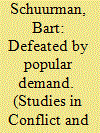

|
|
|
|
|
| Publication |
2013.
|
| Summary/Abstract |
Acquiring and maintaining public support is frequently cited as an important requirement for governments fighting non-state actors. But how exactly can public support influence the course of counterterrorism campaigns and thereby contribute to an escalation or de-escalation of violence? This article argues that public support can provide a mandate for action but that it can also set boundaries for the measures governments and their non-state adversaries can legitimately use. Fluctuations in the quantity and quality of public support for either side can expand or contract these boundaries, potentially instigating marked changes in conflict-related violence levels and affecting the efficacy of government countermeasures.
|
|
|
|
|
|
|
|
|
|
|
|
|
|
|
|
| 4 |
ID:
122258
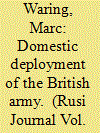

|
|
|
|
|
| Publication |
2013.
|
| Summary/Abstract |
Military Aid to the Civil Power has been employed sparingly, with the exception of Northern Ireland and some niche commitments, for much of the last decade, yet the requirement for it remains. Western democracies such as the UK maintain the ability to deploy their troops on home soil as a last resort, when civilian authorities are overwhelmed or exhausted. The riots of August 2011, for example, prompted calls for the deployment of the army. Marc Waring examines whether the army is still the most appropriate force to assist the police in extremis public-order situations or whether it is time to establish a 'third force', sitting between the police and the army.
|
|
|
|
|
|
|
|
|
|
|
|
|
|
|
|
| 5 |
ID:
153550
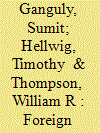

|
|
|
|
|
| Summary/Abstract |
Foreign policy belief systems have received much attention. Yet nearly all work examines attitudes in western democracies, chiefly the United States. The current security environment requires that we ask whether the foreign policy views of individuals in other nations—particularly regional powers—are similar in structure to those found in the US case. This article does so for the Indian case. Drawing on studies of US opinion, we develop a set of claims and test them on an original data set on Indian elites. We make four contributions. First, we show that Wittkopf’s framework applies to the Indian case. Second, we demonstrate how this framework can be made more generally applicable by revising its emphases on different types of internationalism and on rethinking the meaning of isolationist preferences. Third, we place the Indian case in comparative perspective. And last, we model the dimensions of Indian attitudes as a function of domestic ideology. Results of our analyses provide insights into the structure of foreign policy belief systems outside the Global North.
|
|
|
|
|
|
|
|
|
|
|
|
|
|
|
|
| 6 |
ID:
164180
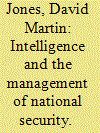

|
|
|
|
|
| Summary/Abstract |
Since 2001 expenditure on the security services has increased exponentially in Western democracies and particularly amongst the Five Eyes community of the UK, the US, Canada, Australia and New Zealand. This has occurred in conjunction with the expansion of counter-terror laws. Yet somewhat problematically the phenomenon of Islamist inspired violence became more threatening to the internal security of western democracies in the first decade of the twenty-first century. This study examines the Western managerial approach to security using Australia as a case study. It argues that the growth of Australian security agencies since 2001 and their evolution into a National Security Community after 2008 has neglected basic maxims of political and constitutional prudence and eschews the modern state’s own contractual self -understanding of sovereignty and political obligation.
|
|
|
|
|
|
|
|
|
|
|
|
|
|
|
|
| 7 |
ID:
123179


|
|
|
|
|
| Publication |
2013.
|
| Summary/Abstract |
The 9/11 attacks and the subsequent increase of counterterrorism laws and regulations in Western democracies have also spurned heavy debates on torture and ill-treatment of captured terrorist suspects. However, while the Netherlands did deploy troops to Afghanistan and adopted new laws and policies regarding counterterrorism, debates on torture remained marginal. Indeed, the Netherlands has not suffered the pressure of a constant high terrorist threat, or endured a catastrophic terrorist attack. However, the author argues that there are more reasons for the lack of heated discussions. While this article does not intend to lift the Dutch case to an exemplary one, it illustrates how Dutch government authorities made good use of the benefits of hindsight regarding torture debates and incidents elsewhere and were able to apply lessons regarding accountability and oversight concerning interrogation issues at home successfully.
|
|
|
|
|
|
|
|
|
|
|
|
|
|
|
|
| 8 |
ID:
103359
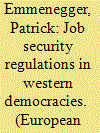

|
|
|
|
|
| Publication |
2011.
|
| Summary/Abstract |
This article uses fuzzy set qualitative comparative analysis (fsQCA) to examine the determinants of job security regulations - here understood as restrictions on hiring and firing - in Western democracies. Unlike previous studies, the analysis reveals three different paths to high levels of job security regulations. The first path covers the Southern European state capitalist countries. In these countries, conflicts between forces pushing for liberal democracy and groups alienated from modernisation have led to high levels of statism and crowded out other societal actors. Job security regulations were enacted relatively early in order to provide social security by means available to the state. Due to fragmented welfare states, job security regulations have remained one of the most important pillars of the social protection regime. The second path covers the Continental European managed capitalist countries and is also characterised by high levels of statism. In these countries, repressive governments employed a stick-and-carrot strategy to weaken the labour movement and tie the loyalties of the individual to the state. After the Second World War, these countries developed corporatist intermediation systems and encompassing and generous welfare states. Finally, the third path covers the Nordic managed capitalist countries. This path is characterised by a high degree of non-market coordination, strong labour movements and few institutional veto points. In the Nordic managed capitalist countries, job security regulations traditionally have been subject to collective agreements. However, in the 1960s, labour movements succeeded in pushing through the public legislation of job security despite opposition from employers' associations. Methodologically, this article demonstrates that cross-national differences in the level of job security regulations can only be explained if the methods used allow for complex causality. In contrast, methods which focus on 'net effects' do not offer satisfactory explanations for the cross-national differences in the level of job security regulations.
|
|
|
|
|
|
|
|
|
|
|
|
|
|
|
|
| 9 |
ID:
176258
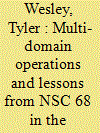

|
|
|
|
|
| Summary/Abstract |
Russia has pursued policies that blur the lines between peace and war. Weapons and enablers used in the five domains (maritime, air, land, space and cyber) have been transformed, leading to improved anti-access and area denial capabilities, as well as faster kinetic and non-kinetic operations. Such changes have occurred before Western democracies have been able to respond. NATO should close this gap by developing a framework for deterrence and containment within this competitive space. The Cold War United States Objectives and Programs for National Security (NSC 68) established goals for policy and promoted guidelines that both limited and authorised necessary acts that shaped an environment advantageous to Western democracies. Tyler Wesley argues that a new framework, inspired by examples drawn from NSC 68, is necessary.
|
|
|
|
|
|
|
|
|
|
|
|
|
|
|
|
| 10 |
ID:
118787
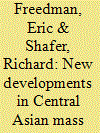

|
|
|
| 11 |
ID:
110688
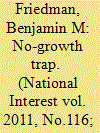

|
|
|
|
|
| Publication |
2011.
|
| Summary/Abstract |
WELL BEFORE the summer's horrific shootings in Norway, many citizens of the Western democracies had the sense that the social fabric was fraying in unexpected places. The Danes restricted immigration in violation of the European Union's Schengen Agreement. The lower house of the Dutch parliament voted-by nearly four to one-to outlaw ritual Muslim butchers (and, along the way, kosher butchers too). The French banned burkas in the streets. The Swiss banned minarets. In America, we are fighting over whether to build a wall between Texas and Mexico and litigating how far individual states can go in enforcing their own laws that bar undocumented immigrants and deny public benefits to those here legally. Most recently, a swath of cities across Britain exploded in racial violence and riots.
|
|
|
|
|
|
|
|
|
|
|
|
|
|
|
|
| 12 |
ID:
133659
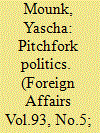

|
|
|
|
|
| Publication |
2014.
|
| Summary/Abstract |
The Tea Party and its European cousins have emerged from the enduring inability of democratic governments to satisfy their citizens' needs. Today's populist movements won't subside until the legitimate grievances driving them have been addressed.
|
|
|
|
|
|
|
|
|
|
|
|
|
|
|
|
| 13 |
ID:
117458
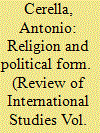

|
|
|
|
|
| Publication |
2012.
|
| Summary/Abstract |
Jürgen Habermas's post-secular account is rapidly attracting attention in many fields as a theoretical framework through which to reconsider the role of religion in contemporary societies. This work seeks to go beyond Habermas's conceptualisation by placing the post-secular discourse within a broader genealogy of the relationships between space, religion, and politics. Drawing on the work of Carl Schmitt, the aim of this article is to contrast the artificial separation between private and public, religious and secular, state and church, and the logic of inclusion/exclusion on which modernity was established. Revisiting this genealogy is also crucial to illustrating, in light of Schmitt's political theory, the problems underlying Habermas's proposal, emphasising its hidden homogenising and universalist logic in an attempt to offer an alternative reflection on the contribution of religious and cultural pluralism within Western democracies.
|
|
|
|
|
|
|
|
|
|
|
|
|
|
|
|
| 14 |
ID:
115270
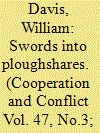

|
|
|
|
|
| Publication |
2012.
|
| Summary/Abstract |
This analysis focuses on the effects of domestic public pacifist opinion and international security threats on foreign policy outputs. Much work has suggested that governments' foreign policy outputs are responsive to public opinion in advanced democratic countries. Using the cases of several Western democracies, this article offers a theory of the effect of public pacifism on foreign policy. It employs a cross-sectional time-series analysis over a period of a quarter century to test the theory and the generalizability of the hypothesis of an opinion-foreign policy nexus using new measures and broader data. Results here contradict literature on expected public opinion and policy outputs in the Cold War period, yet are supported after. The findings indicate that the predicted effect of public opinion on foreign policy outputs to be conditional on the presence of security threats. Convergence between leaders and public opinion in post-Cold War Western democracies is likely to make hawkish foreign policy less tenable in the West.
|
|
|
|
|
|
|
|
|
|
|
|
|
|
|
|
| 15 |
ID:
109522
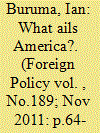

|
|
|
| 16 |
ID:
103122
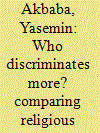

|
|
|
|
|
| Publication |
2009.
|
| Summary/Abstract |
Unlike its presence in the world of politics, religion failed to take a prominent role in political science in much of the modern era. Recent research suggests this might be changing. It also suggests that in order to study religion, scholars need more data on the subject. This study introduces a new data collection on religious discrimination at the minority level and uses this new data collection to compare religious discrimination in western democracies, Asia and the Middle East for the time period 1990-2004. In this paper, religious discrimination, ethnicity and religion are first discussed with specific emphasis on Muslim majority states and the Middle East. Second, the process of data collection, including case selection, forming a religious discrimination index, coding and back-up coding issues, is outlined. Finally, results on religious discrimination in different regions and states with different majority religions are presented. The data indicate that western democracies treat their religious minorities much better than Middle Eastern countries or Asian countries. Yet the Middle East, which is considered the most prominent example of a region with religious tension, does not have significantly higher average religious discrimination values than Asia. Similarly, even though states with a Muslim majority seem to be less tolerant compared to states with a Christian majority, in states with other majority religions such as Buddhism or Hinduism, discrimination against ethnoreligious groups is present as well. Moreover, religious discrimination values for the minorities in western democracies increased after September 11.
|
|
|
|
|
|
|
|
|
|
|
|
|
|
|
|
|
|
|
|
|